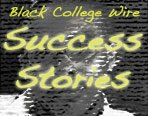| Juneteenth Needs National Recognition |  |
 |
 |
| By Dasha Flournoy -- Black College Wire | |
|
Since I was little, each year approaching the month of June, I would begin to hear talk of something called Juneteenth. I remember going to cookouts, getting T-shirts with JUNETEENTH, along with some celebratory words written across the front, and block parties. 
The Gramblinite
Dasha Flournoy
When I was a child, my mom used to say I asked too many questions. Now that I'm older, we both realize questions were my way of researching. To this day, I still do not just take what I'm given and believe it to be true. I always believe there is something deeper than what is presented to the eye or ear. My granny used to preach to me, "Miss Dae, out of all thy getting, get an understanding." I still live by those words today. To find out what you want to know or get to the root of a problem, you have to do just that … get to the root. As I got older, I began to get a more passionate interest in my past and my ancestors. In grade school, we were taught about slavery; then we learned that we were eventually free. While this isn't falsified information, I felt there was more to the story. There HAD to be more. I began using my natural research method from childhood; I began asking questions. I also did some research of my own as well. It began to make more sense to me. Surprisingly enough, that same celebration I would go to a week out of my childhood summer was the very thing I was led back to: Juneteenth. In short, Juneteenth, or June 19, 1865, was the day that the slaves in Galveston, Texas, learned of their freedom, approximately 2 1/2 years after President Abraham Lincoln's Emancipation Proclamation that "set free" on Jan. 1, 1863; finally making "all" of the slaves in America free. So why did it take so long for Gen. Gordon Granger of Texas and his troops to get the news to the slaves in Galveston? Then I began to question more recent issues: Why isn't Juneteenth a national holiday? Not trying to stir up conflict or anything, but is America celebrating a false holiday with Columbus Day? I mean after all, we know America belonged to the Indians before Columbus so-say "found" it. Is the fact of my ancestors being freed not worthy enough to be made a national holiday? Whether you know it or not, America, countries such as Ghana, Israel, Japan and China celebrate Juneteenth. I respect Texas for making Juneteenth a state holiday in 1980, as well as the states of Alaska, Arkansas, California, Connecticut, Delaware, Florida, Idaho, Illinois, Iowa, Kentucky, Louisiana, Michigan, Missouri, New Jersey, New York, Oklahoma, and Wyoming for celebrating the holiday here in America. My ancestors worked, died, were raped and degraded to build this America. This ultimately made them the foundation of this new America. I feel that a national recognition, not just a few states' participation, is in order. Don't you? Since we all know that the children are our future, why isn't it a mandatory part of their history lesson? This was another question that puzzled me about my Juneteenth's history. I never heard of this holiday brought up in a classroom in Springhill. It shouldn't be left to only our elders to pass this story down through history. Juneteenth isn't just Black history; it should be American history. Dasha Flournoy writes for The Gramblinite, the Grambling State University student newspaper, which originally published this article. Articles in The Voices section reflect the opinions of the individual writers and do not represent the views of Black College Wire. |
|
| Posted Jun. 23, 2009 |
| Next > |
|---|



